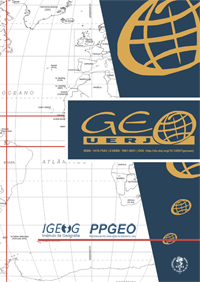GLOBALIZATION AND FINANCIAL AND TECHNOLOGICAL INTEGRATION AMONG EMERGING COUNTRIES: THE BRICS NEW DEVELOPMENT BANK
DOI:
https://doi.org/10.12957/geouerj.2015.18952Keywords:
Globalization, Financial Deregulation, Social Inequality, BRICS BankAbstract
Doi: 10.12957/geouerj.2015.18952
This study analyzes the manner in which the financial deregulation and bankruptcy of the credit system of the mainstream economies (United States, United Kingdom, Japan and European Union) are influencing the financial and technological integration and restructuring processes of the emerging countries with respect to the new development bank of the BRICS nations (Brazil, Russia, India, China and South Africa).The objective is to show that actions against the current deregulated neoliberal finance model (such as the creation of the BRICS bank, construction of the pipeline infrastructure and establishment of networks parallel to the Internet, which is controlled by the United States) could trigger a geopolitical rearrangement in the current model of globalized accumulation of international finance capital. In order to conduct this investigation, we surveyed and collected statistical data and economic and financial information at the following research institutions: the World Bank, the International Monetary Fund (IMF), the U. S. Treasury, the Divisions of Research & Statistics and Monetary Affairs of the U. S. Federal Reserve Board, Eurostat (a Directorate-General of the European Commission), the Organization for Economic Cooperation and Development (OECD), the Stockholm International Peace Research Institute (SIPRI) and the Institute of Applied Economic Research (IPEA - Instituto de Pesquisa Econômica Aplicada). This study aims at providing a series of reflections and questions for the debate on how the financial crisis and the indebtedness of the United States and the mainstream economies are forcing emerging countries to seek: a) new forms of regional integration; b) economic, commercial, technological and financial arrangements; and c) sustainable alternatives that minimize social inequalities aggravated by economic neo-liberalism’s globalization policies.
Downloads
Download data is not yet available.
Downloads
Published
2015-12-20
How to Cite
PIRES, Hindenburgo Francisco. GLOBALIZATION AND FINANCIAL AND TECHNOLOGICAL INTEGRATION AMONG EMERGING COUNTRIES: THE BRICS NEW DEVELOPMENT BANK. Geo UERJ, Rio de Janeiro, n. 27, p. 283–292, 2015. DOI: 10.12957/geouerj.2015.18952. Disponível em: https://www.e-publicacoes.uerj.br/geouerj/article/view/18952. Acesso em: 5 feb. 2026.
Issue
Section
Articles
License
The copyright of articles published in Geo UERJ belongs to their respective authors with rights to first publication conceded to the journal. Every time that the article is cited and reproduced in institutional repositories or personal and professional web pages the link to the journal web page must be provided Geo UERJ.

The articles are simultaneously licensed under theCreative Commons Atribuição-Não Comercial-Compartilha Igual 4.0 Internacional.


